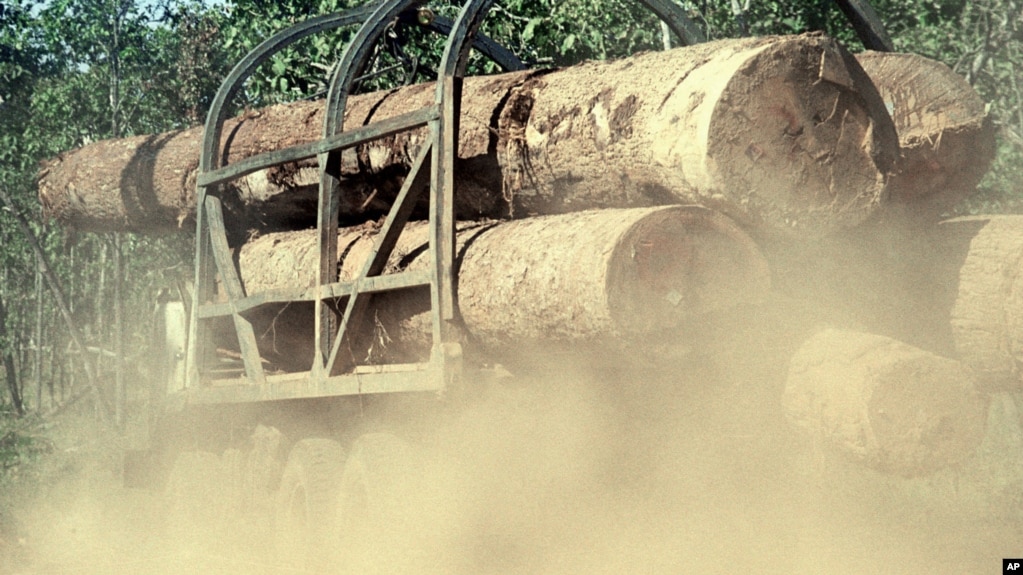 Rapid deforestation has prompted regional governments to ban logging or raw timber exports in in recent years. PHOTO: ENVIRONMENTAL INVESTIGATION AGENCY
Rapid deforestation has prompted regional governments to ban logging or raw timber exports in in recent years. PHOTO: ENVIRONMENTAL INVESTIGATION AGENCYCambodia 'investigating' claims of timber smuggling to Vietnam
Straits Times | 15 May 2017
BANGKOK - Cambodia is investigating claims of large-scale logging and timber smuggling to Vietnam highlighted in a recent investigative report.
The Kingdom's environment minister, Mr Say Sam Al, was quoted by Cambodia Daily saying investigations had been taking place for "about a year", but refused to disclose more details about the probe.
He made the comments on Sunday (May 14), about a week after the release of report by the Britain- and US-based non-profit organisation Environmental Investigation Agency (EIA), which highlighted how Vietnam's companies are violating a Cambodian ban on timber exports with help from complicit government officials and military personnel.
According to the report, in just three months from December last year to February this year, at least 300,000 cu m of timber was stolen or smuggled out of Cambodia into Vietnam. That is enough timber to fill more than 100 Olympic sized swimming pools by volume.
The wood, however, is laundered through a quota system in Vietnam, giving it lawful status in the country and even making them taxable. The trade itself is worth at least US$75 million (S$104.9 million) and estimated kickbacks are worth more than US$13million.
"The blatant illegal logging witnessed by EIA in Cambodia's Ratanakiri Province represents a criminal conspiracy between elements of the Vietnamese Government, well-connected timber companies and corrupt Cambodian officials," said the EIA report.
Responding to the report, Mr Sam Al said "some of the claims are new", but some were "already part of our investigation".
Vietnam's Ministry of Foreign Affairs, in response to Straits Times queries, said the country "strictly observes" international commitments.
"Vietnam law strictly prohibits smuggling, including illegal logging. All acts of smuggling, including illegal logging shall be seriously dealt with in line with the rule of law in Vietnam," it said in an e-mailed statement. "Vietnam and Cambodia regularly maintain close cooperation in stopping smuggling, including illegal logging."
Rapid deforestation has prompted regional governments to ban logging or raw timber exports in in recent years. Laos, Vietnam, Cambodia are among those with active bans. Myanmar imposed a one-year moratorium on logging, which was lifted in March. That same month, China announced that it had halted commercial logging in forests.
But the region's wood processing and hardwood furniture industry continues to thrive, fuelling an underground trade in illicit timber from countries where policing is weak.
Vietnam is one of the world's top wood processors, having exported US$7.3 billion worth of wood and wooden products last year.
Trade in vulnerable species of animals and plants is restricted under the Convention on International Trade in Endangered Species of Wild Fauna and Flora (CITES). But a report last year by the United Nations Office on Drugs and Crime notes that, except for the species listed in CITES, "most destination countries lack a legal basis for refusing wood that was harvested or exported contrary to source country regulations".
Illegally logged or exported timber therefore can easily become part of lawful furniture exports of another country.
EIA's report notes that, until 2015, Laos - even with a log export ban - was the largest supplier of timber to Vietnam by value. But tightened control by Laos last year shrivelled the supply.
Meanwhile, Vietnamese imports of logs from Cambodia have grown, in part aided by Hanoi's move in 2014 to deregulate trade in timber from Cambodia. It removed import document requirements, and allowed such trade to take place through any border gate.


No comments:
Post a Comment